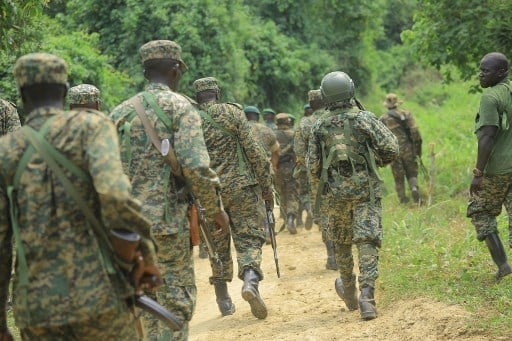Regional blocs order immediate withdrawal of armed DRC groups

Uganda People's Defence Forces (UPDF) troops are seen on the Mbau-Kamango road in the Beni district on December 8, 2021. PHOTO/AFP
What you need to know:
- Last week, the UN World Food Programme (WFP) said that since March 2022 alone, 5.7 million people have been displaced in the eastern provinces of North Kivu, South Kivu and Ituri.
A quadripartite summit of four regional blocs has demanded an immediate and unconditional withdrawal of all armed groups in the eastern Democratic Republic of Congo (DRC) in an effort to end the decades-long war.
The resolution was made by heads of States and government of the East African Community (EAC), Economic Community of Central African States (Eccas), International Conference on the Great Lakes Region (ICGLR) and Southern African Development Community (Sadc) at a meeting held in the Angolan capital Luanda Tuesday.
The instability in mineral-rich east DRC is a concern all over the globe.
On Monday, the United States warned that withdrawing UN peacekeepers from the DRC, which Kinshasa has suggested take place after December elections would be premature.
Last week, the UN World Food Programme (WFP) said that since March 2022 alone, 5.7 million people have been displaced in the eastern provinces of North Kivu, South Kivu and Ituri.
Overall, 6.2 million people have fled their homes across the country – the highest number in Africa.

Regional heads of State and Government and experts in Luanda, Angola for the Quadripartite Summit on DRC. PHOTO | OFPP
Latest projections indicate that 25.8 million people in the DRC will face acute food insecurity this year– the highest number worldwide, the WFP also indicated.
The Luanda summit came as a follow-up of other gatherings over the DRC conflict.
Earlier this month, also in Luanda, regional leaders welcomed the Sadc deployment of troops to the eastern DRC.
But on Tuesday, under the auspices of the African Union (AU), the Luanda summit noted in particular, the withdrawal of the M23 rebel group, Islamist-linked ADF and Hutu-militia FDLR, and expressed concern over the prevailing insecurity and humanitarian situation in the DRC, exacerbated by the criminal activities of the armed and terrorist groups.
The AU Commission chair, Moussa Faki Mahamat, said the summit had taken note of "the progress made on the preparation for the pre-cantonment and cantonment sites for the disarmament of the M23 while underscoring the need to continue implementing the Disarmament, Demobilisation, Reintegration Community Stabilisation (DDRC-S) Programme for ex-combatant.”
The summit, chaired by Comoros President Azali Assoumani, who doubles as the AU chairperson, also expressed concern for the non-compliance of the M23 to withdraw from the occupied territories as outlined in the Luanda Roadmap of November 23, 2022, and called for the establishment of humanitarian corridors.
The quadripartite summit hosted by Angola President João Lourenço and the AU Champion for Peace and Reconciliation in Africa and chairperson of the ICGLR was attended by Presidents Félix Tshisekedi of the DRC and Burundi's Évariste Ndayishimiye, who chairs the EAC and the Peace, Security and Cooperation Framework for DRC and is the AU Champion for Youth, Peace and Security in Africa.
President Ali Bongo of Gabon and Emmerson Mnangagwa of Zimbabwe, who chair Eccas and the bloc's Peace and Security Council, respectively, were also in attendance.
Kenya's former President Uhuru Kenyatta and the facilitator of the EAC-led Nairobi Process on the Restoration of Peace and Stability in eastern DRC also attended the summit.
The blocs' secretariats, Namibia, Rwanda and the UN also sent envoys to the summit.




